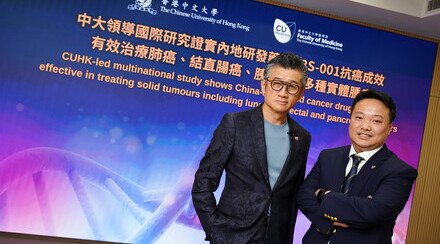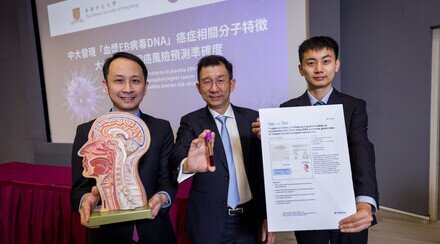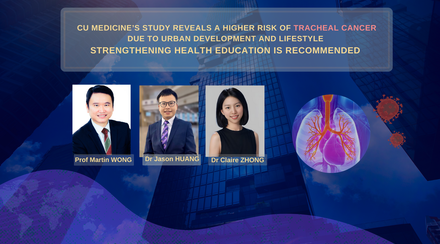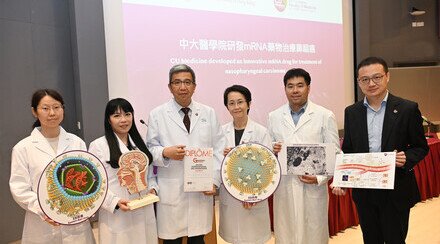Professor Anthony Chan honoured with the ESMO Lifetime Achievement Award Global recognition for his leadership and outstanding research in nasopharyngeal cancer
Professor Anthony Chan, Pro-Vice-Chancellor, Vice-President and Li Shu Fan Medical Foundation Professor of Clinical Oncology at The Chinese University of Hong Kong (CUHK), has been bestowed the European Society for Medical Oncology (ESMO) Lifetime Achievement Award, one of the most prestigious international honours given to cancer researchers, for his lifelong dedication to outstanding research in nasopharyngeal cancer (NPC). Professor Chan has conducted pivotal studies that set new treatment standards in multimodal approaches to locoregionally advanced disease, developed clinical applications of biomarker Epstein-Barr virus (EBV) DNA, and pioneered immunotherapeutic and targeted therapeutics for the disease.

Professor Chan expressed his heartfelt gratitude and deepest appreciation to his research team and global collaborators for their unwavering and immense support in advancing cancer research over the past 30 years.
Setting new treatment standards for NPC
NPC is one of the most aggressive head and neck cancers. It has among the highest incidence rates in Asia and is uniquely prevalent in Southern China, including Hong Kong. Almost three decades ago, NPC was generally diagnosed by surgeons and then, due to its radiation-sensitive nature, managed by radiation oncologists. This approach achieved high rates of local control, but 30% to 50% of patients died because the cancer had metastasised.
Professor Chan joined CUHK’s Faculty of Medicine (CU Medicine) in 1993 after specialist training in medical oncology in the UK. His journey towards applying the modern integrated multimodal treatment approach that combines radiotherapy and chemotherapy to the management of advanced nasopharynx cancer began in 1994, with the first multi-centre prospective randomised trial in locoregionally advanced disease, which demonstrated that the addition of concurrent cisplatin to radiotherapy (RT) increased five-year survival rates from 59% to 70% compared with RT alone. This trial resulted in the adoption of concurrent chemotherapy and radiotherapy (CRT) as the standard of care in the world.
Professor Chan conducted further trials in the 2000s and provided randomised data supporting the efficacy of neoadjuvant chemotherapy in locoregionally advanced NPC. Since 2019, incorporation of neoadjuvant chemotherapy has become the standard treatment practice for NPC.
His research team has also achieved many firsts in NPC research, including defining the prognostic significance of post-treatment EBV DNA and using this biomarker to risk-stratify patients for adjuvant therapy; translating epigenetic therapy for nasopharyngeal cancer patients; and more.
Professor Chan has published extensively in international journals and delivered hundreds of international lectures. He has published reviews in The Lancet and Nature Reviews Clinical Oncology, as well as ESMO treatment guidelines for NPC. He has served on the Editorial Board of the Journal of Clinical Oncology and has been Associate Editor of Annals of Oncology since 2014. In addition, Professor Chan has served in various leadership roles in oncology service and research in Hong Kong. He is currently the Director of the Sir YK Pao Centre for Cancer at the Prince of Wales Hospital, Director of the Hong Kong Cancer Institute, and Chief Director of Phase 1 Clinical Trial Centre and Associate Director of the State Key Laboratory of Translational Oncology (CUHK).

Professor Anthony Chan is bestowed with the European Society for Medical Oncology (ESMO) Lifetime Achievement Award for his lifelong dedication to and outstanding research work in nasopharyngeal cancer (NPC). Professor Chan is one of the only three Asian scholars who have received this very prestigious global award since its establishment.
Lifelong dedication to NPC lasting more than three decades
.jpeg)
At the award presentation ceremony, Professor Chan delivered the lecture, titled “East meets West: My NPC journey” to review the significant milestones in the management of this cancer in the past three decades and the future development.
At the award presentation ceremony, Professor Chan said, “I am most grateful to receive this honour from the ESMO and I am deeply thankful to my research team and global collaborators for their immense support in advancing nasopharyngeal cancer research over the past 30 years. Looking ahead, considering immunotherapy is a very hot topic, our research team is finding more active combinations of different immunotherapeutic agents.”
Since the ESMO Lifetime Achievement Award was established, only three Asian scholars have received it. In addition to Professor Chan, the other two are Professor Nagahiro Saijo, the founder of the Japanese Society of Medical Oncology; and Professor Tony Mok, Chairman of the Department of Clinical Oncology at CU Medicine.
About the European Society for Medical Oncology (ESMO)
With more than 30,000 members representing oncology professionals from over 168 countries, the European Society for Medical Oncology (ESMO) is the world’s leading professional organisation for medical oncology and the society of reference for oncology education and information. The ESMO is committed to improving the quality of cancer care, from prevention and diagnosis all the way to palliative care and patient follow-up. Its mission is to educate doctors, cancer patients and the general public on the best practices and latest advances in oncology, and to promote equal access to optimal cancer care for all patients.


















































